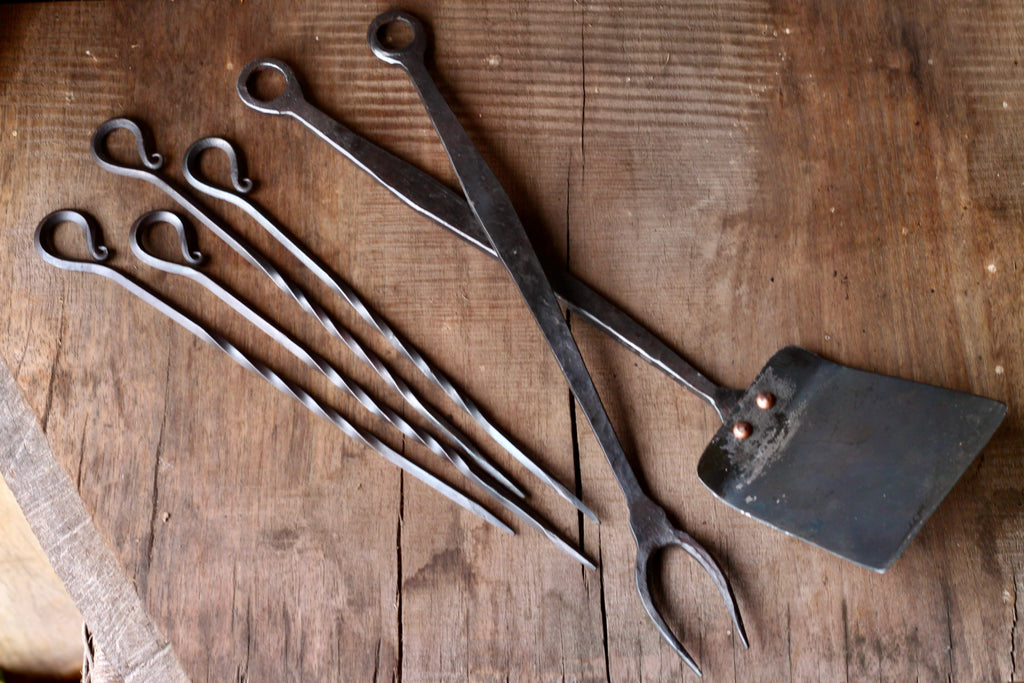Maintaining Your Wicks Forge Cooking Utensils

Maintaining Your Wicks Forge Cooking Utensils
If you’ve purchased any of our cooking tools, like our Egg Spoons, BBQ Cooking Forks or newly released Camping Pans, Grilling Forks, and Spatula-- they are sure to become a new staple in your kitchen.
While these tools are all extremely durable, there are some ways you can maintain them so that they cook up a perfect meal every time, for as long as you use them.
Here at Wicks Forge, we recommend maintaining our cookware the same way you would a cast iron pan. If you're familiar with cast iron cookware, you know that when properly seasoned the pan is rust resistant, non-stick, and only gets better the more you use it.
Just like our products, cast iron is formed out of actual iron, which is a dark grey in colour and very reactive to moisture and humidity-- meaning without seasoning, they can rust pretty quickly. Seasoning your cast iron is the process of heating multiple thin layers of fat--like cooking oil or sometimes lard-- which polymerizes to create a hard, black protective surface that is perfect for non-stick cooking.
Fortunately for you, all of Wicks Forge cooking products are sealed and protected with a combination of oils and beeswax while hot, so they’ve already got that protective coating and are ready for cooking the minute they arrive at your door.

Generally, well seasoned cookware won’t need to be seasoned again, since you’ll be using some sort of oil when cooking, which will only add to the existing surface. The seasoned surface is extremely durable against scratching from metal utensils and most dish soaps today are gentle enough that they’ll only be removing food grease. If you want to be absolutely sure that your cookware lasts forever, here are a few things to keep in mind as you use them:
- The more frequently you use it the better it gets: Using your egg spoons or cast iron cookware for oil-based searing or frying (mmm fried eggs), will build on an additional layer of polymer and protect the surface even more.
- Clean it while it’s hot: Removing food build up and grease will be easier while your cookware is still slightly hot, meaning a bit of soap and a soft sponge will do the trick.
- Gentle cleaning is better: Try and avoid abrasive cleaning tools and products, like metal scouring pads or cleaners like Comet. Even using too much elbow grease can mean working away at your seasoning.
- Care after cleaning: After you’ve cleaned and thoroughly dried your cookware, reheat it and rub it with a thin layer of oil and a paper towel. Once done, you can remove it from the heat and let it cool, which will add an extra layer of protection before its next use.

When you need to re-season
Well-seasoned cookware that is properly maintained won’t need to go through another full seasoning process. There are only two issues that you might run into if your seasoning isn’t maintained: scaling and rust.
Scaling happens when you heat the pan too many times without adding any additional oil to protect it. You will notice part of your cookware develops a rough texture, as the seasoning has flaked off in chunks, rather than the normally microscopic wear that happens when regularly oiling the surface after heating it.
You can easily avoid this type of damage by regularly heating and oiling after each use-- but once you notice scaling, you’ll have to season your cookware all over again. Seasoning cookware from scratch is more of an involved process, which we will cover step by step in the future. Subscribe to our newsletter so you don’t miss it!
Rusting will happen if the cookware hasn’t been well seasoned in some areas and is left to air dry. The moisture that comes into contact with the iron can cause rusting, so properly drying and oiling your cookware between use is an important defense to this.
If you do notice rusting on the surface, simply rinse your cookware before drying, heating, and applying a small amount of oil to the entire surface to build another protective layer. Another few rounds of use with oil should cover the rusted area, protecting it from further damage. If your cookware is completely rusted, then you will have to do the seasoning process from scratch.

Leave a comment